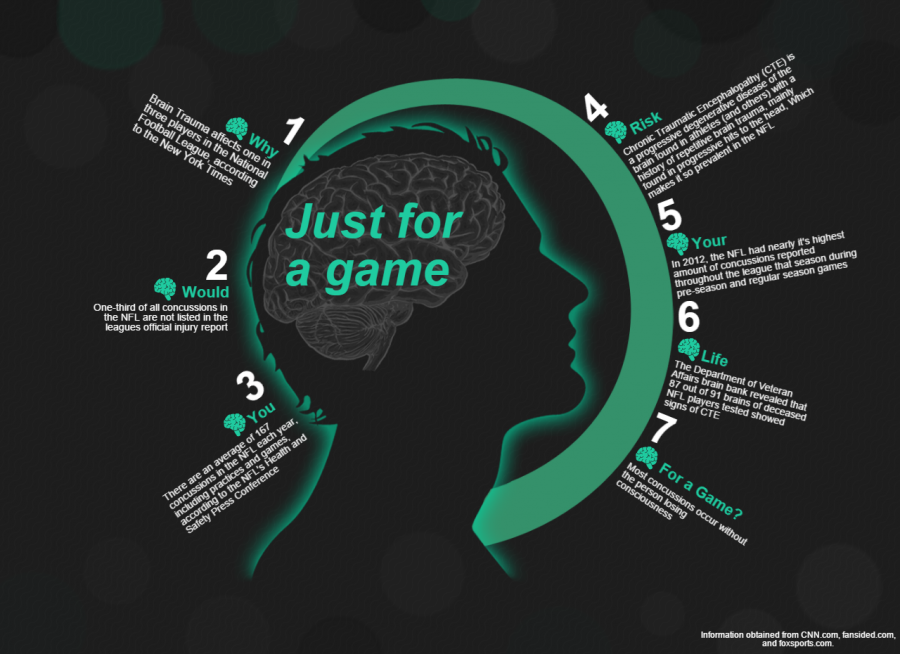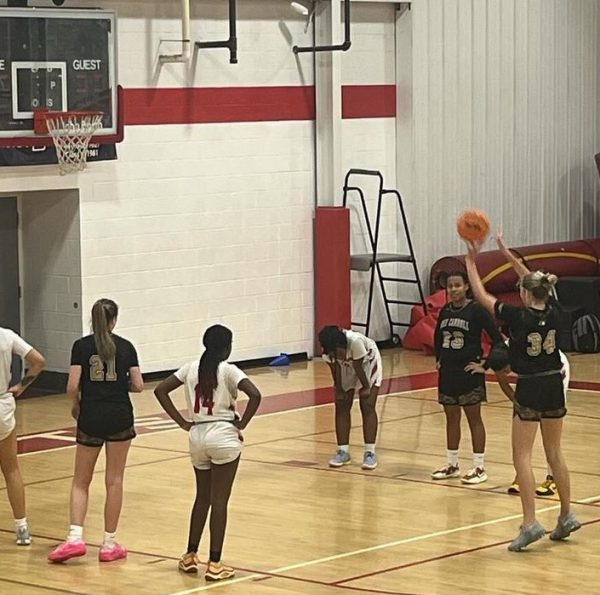Brain trauma severely impacting NFL players’ futures
With increase of head injuries in the NFL, players have, in reaction, increased the number of lawsuits. However, the fatal problem certainly needs to be address and dealt with head on.
A recent study conducted by researchers with the Department of Veteran Affairs and Boston University proved that 87 out of 91 deceased NFL players tested positive for the degenerative disease chronic traumatic encephalopathy (CTE).
The reasoning for the disease’s prevalence among NFL players is due to the sports aggressive nature, creating head trauma for players through multiple hits to the head. Some players can go their entire career without a single diagnosed concussion, however all players are still at risk for CTE.
The disease is impossible to diagnose while a person is alive. However, symptoms while alive can hint at the possibility of the disease. Symptoms include: memory loss, confusion, aggression, depression, anxiety, suicidality, parkinsonism, and, eventually, progressive dementia.
It’s hard to understand why athletes would jeopardize their long-term health. Knowing the risks they take each time they step out onto the field, players should know when to stop for their own well-being.
The symptoms often don’t appear until years after the person’s career. Also, the person may believe they are healthy when they actually are the exact opposite. Since no person can be diagnosed with the disease until postmortem, sufferers can have serious symptoms without knowing what is wrong with them until they ultimately die.
Unfortunately, this “eventual passing” has come faster than expected in some cases. On May 2, 2012, retired linebacker Junior Seau was found dead due to a self-inflicted gunshot wound. While Seau had no prior reported history of any concussions, his brain was tested and on January 10, 2013, Seau’s family released the results that stated Seau’s brain showed definitive signs of CTE.
Days after his positive test for CTE, Seau’s family sued the NFL for his brain related injuries, which is believed to have connected to his suicide less than a year earlier. They opted out of the NFL’s current concussion lawsuit settlement, which took years to create after players started suing the NFL. Eventually, the settlement was funded with a $765 million fund from the NFL.
The story of former Kansas City Chiefs linebacker Jovan Belcher is another famous example of the long problems with CTE in the NFL. Belcher played in the league for a little over three seasons.
After a long night of arguing with his girlfriend, Belcher eventually pulled out a gun and shot his girlfriend nine times while his daughter and mother were in the same room. Belcher then went to Arrowhead Stadium, got out of his car and stood in front of of the franchise owner Clark Hunt, then head coach Romeo Crennel, and general manager Scott Pioli with a gun against his head.
Although they pleaded with him not to do it, he eventually killed himself in the parking lot of the stadium. Later, after his death, Belcher was found with positive signs of CTE. A family lawyer later filed a wrongful death lawsuit against the Chiefs, alleging that the team ignored warning signs of CTE, which may have resulted in his murder-suicide.
Many stories like Seau’s and Belcher’s have contributed to the concussion lawsuit settlement from the NFL and further safety precautions as far as head trauma in the league.
Along with the stories of the deceased and cases of affliction with CTE, many players such as; linebacker Patrick Willis, quarterback Jake Locker, linebacker Jason Worilds and cornerback Cortland Finnegan have all announced their retirement last year because of the possibility of contracting this disease and what it will cost them during life after football.
Just in 2015, many players retired early in an effort to conserve their health, mainly including their mental health. Chris Borland, a case of early retirement, retired in March due to his concern with head trauma and how his few concussions would eventually affect him later in life. “I’m concerned that if you wait until you have symptoms, it’s already too late,” Borland told ESPN’s “Outside the Lines.”
I’m concerned that if you wait until you have symptoms, it’s already too late
— Retired linebacker Chris Borland
Some players, however, seem to not be concerned at all about their past and what it will do to their future. A recent case involves current St. Louis Rams wide receiver Wes Welker. Welker has had a long history with concussions in his career. He was once diagnosed with three concussions in a ten month period.
There were rumours that Welker was being blackballed from the NFL after his long history with head trauma. However, on Nov. 9 Welker was signed to a 1-year, $1.8 million deal with the St. Louis Rams. Many players, including Champ Bailey, a previous teammate of Welker’s, have expressed their desire for Wes Welker to retire due to his concussion history.
“I don’t want Wes to play for my own personal reasons,” Bailey told sports website SBNation, “I’ve seen him get concussions, it scares me.” Bailey has also expressed how Welker will most likely have difficulty after football and that he should think about his future.
“It’s a serious thing when you start talking about your head,” Bailey said, “For him to have to worry about that at a young age that he is now, he has to think about those years to come.”
Many people don’t know the severity that one concussion can have on a person. When professionals get a concussion, the common fan would think, “Oh, he got a concussion, he’ll be back soon and be fine.” However, the fact of the matter is that he will not be just “fine.”
These new studies of common head trauma should shed light on a very important matter that not many fans know about. Hopefully fans, and even the players, will no longer dismiss concussions as just another injury and realize what horrific impacts it could have in their future.
Grant Sharretts is a Sports Editor for The Patriot and jcpatriot.com.










